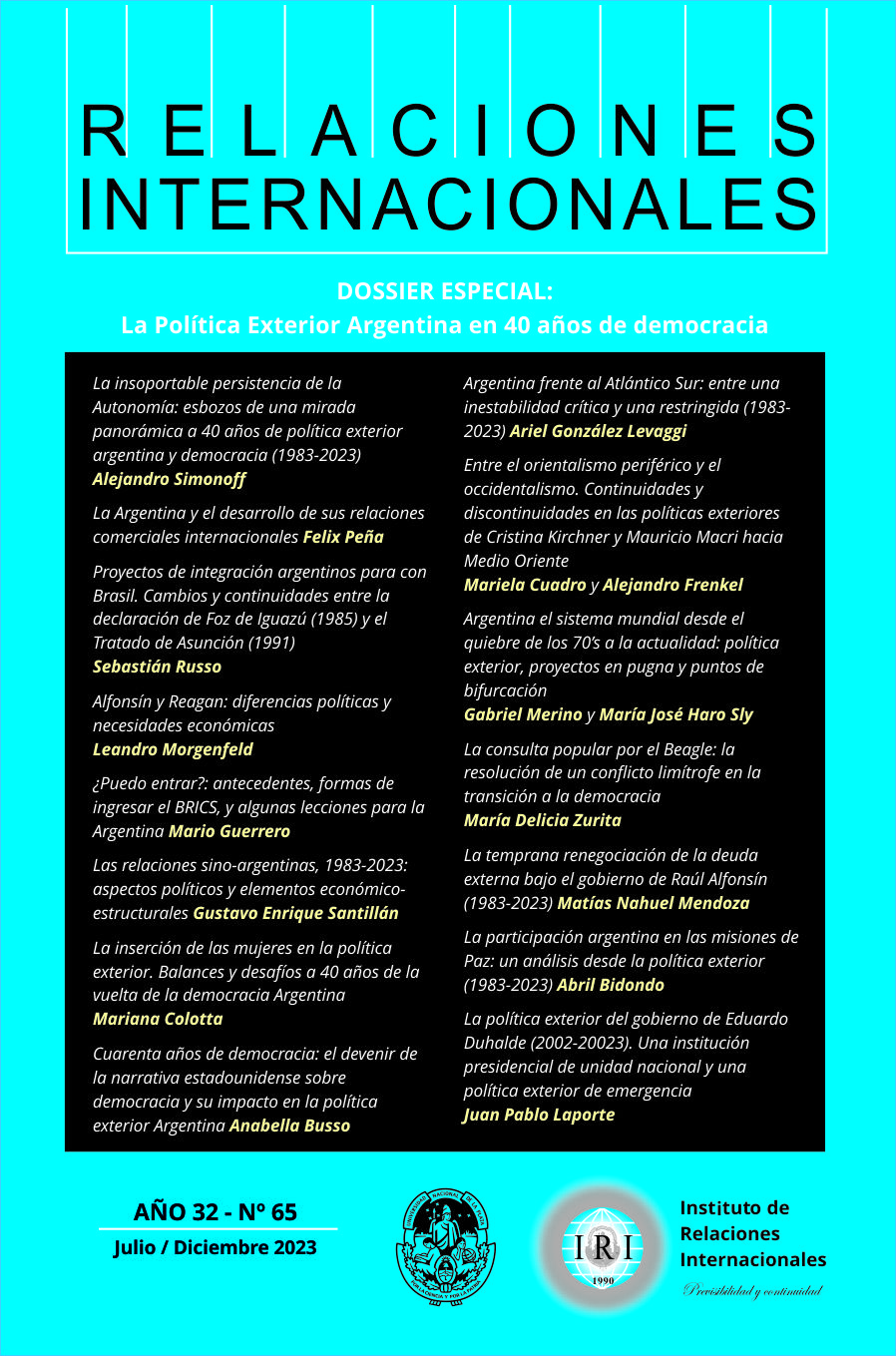Argentina vis a vis the South Atlantic: Between a critical and a limited instability (1983-2023)
DOI:
https://doi.org/10.24215/23142766e177Keywords:
South Atlantic, instability, Argentina, Malvinas islands, conflictsAbstract
The international system provides a disparate set of incentives for latent conflict situations in the Global South and the intensity of latent conflicts influences affects regional security dynamics. The Malvinas question, understood as the sovereignty conflict between the Argentine Republic and the United Kingdom over the Malvinas, South Georgias del Sur Malvinas, South Georgia, South Sandwich Islands and the surrounding maritime areas, represents the main sovereignty conflict in the South Atlantic. This, though, coexists with the changes which have taken place internationally, whereby incentives have been created to lower the conflict dynamics of the post-Cold War period. This essay analyzes the route taken by the South Atlantic from 1983 to 2023, focusing on the stability/instability balance shaped by the interaction between regional conflicts and the projection of extra-regional actors in the South Atlantic maritime space.
Downloads
References
Abdenur, A. E., Mattheis, F. y Seabra, P. (2016). An ocean for the Global South: Brazil and the zone of peace and cooperation in the South Atlantic. Cambridge Review of International Affairs, 29(3), 1112-1131. https://doi.org/10.1080/09557571.2016.1230592
Ayuso, A. y Viilup, E. (2013). Introducción: una nueva mirada al Atlántico. Revista CIDOB d'Afers Internacionals, 102(103), 7-27. http://www.jstor.org/stable/23611585
Cisneros, A. y Escudé, C. (2000). Historia General de las Relaciones Exteriores de la República Argentina. Tomo XII. Grupo Editor Latinoamericano.
Corbacho, A. (2004). Prenegotiation and mediation: The Anglo-Argentine diplomacy after the Falklands/Malvinas War (1983-1989). Documento de trabajo N° 269. https://dx.doi.org/10.2139/ssrn.1013663
Dodds, K. (2012). Stormy waters: Britain, the Falkland Island and UK-Argentine relations. International Affairs, 88(4), 683-700. https://doi.org/10.1111/j.1468-2346.2012.01096.x
Duarte, E. (2016). Brazil, the Blue Economy and the maritime security of the South Atlantic. Journal of the Indian Ocean Region, 12(1), 97–111. https://doi.org/10.1080/19480881.2015.1067384
Duarte, P. y Ferreira Pereira, L. (2023). The South Atlantic in China’s global policy: Why It matters?. En P. Duarte, F. Leandro y E. Martínez Galán (Eds.), The Palgrave handbook of globalization with chinese characteristics: The case of the Belt and Road Initiative (pp. 705-722). Palgrave Macmillan.
Escudé, C. (1992). Realismo periférico. Fundamentos para la nueva política exterior argentina. Planeta.
Espach, R. (2021). A new great game finds the South Atlantic. War on the Rocks. https://warontherocks.com/2021/03/a-new-great-game-finds-the-south-atlantic/
Fraga, J. (1983). La Argentina y el Atlántico Sur. Instituto de Publicaciones Navales del Centro Naval y Pleamar.
Fraga, J. (2000). Siglo XXI: Malvinas Argentinas. Propuestas para una política de Estado. Academia Nacional de Geografía, Publicación especial 14.
Gamba-Stonehouse, V. (1989). Strategy in the southern oceans: A south american view. Pinter Publishers.
González Levaggi, A. (2009). Identidades y relacionamientos multinacionales de baja intensidad: el Caso de la Zona de Paz y Cooperación del Atlántico Sur (ZPCAS). En P. E. A., Jiménez (Comp.), Teorías de Relaciones Internacionales y aplicación práctica (pp. 52-99). Tomo II. Benemérita Universidad Autónoma de Puebla.
Gonzalez Levaggi, A. (2022). Del Indo-Pacífico al Atlántico Sur: estrategias marítimas de las grandes potencias del siglo XXI. Instituto de Publicaciones Navales.
Kelly, P. y Child, J. (1990). Geopolítica del Cono Sur y la Antártida. Pleamar.
Lechini, G. (2006). Argentina y África en el espejo de Brasil: ¿política por impulsos o construcción de una política exterior? Consejo Latinoamericano de Ciencias Sociales.
Mántaras, M. (2019). La fórmula del paraguas de soberanía hacia la cuestión Malvinas: ¿aplicable a la política exterior de Macri? Relaciones Internacionales, 28(56), 223- 237. https://doi.org/10.24215/23142766e063
de Medeiros, R. D. C. (2003). O Acordo de Cooperação Militar Brasil Namíbia como instrumento de consolidação da zona de paz e cooperação do Atlântico Sul. A Defesa Nacional, 89(795). http://www.ebrevistas.eb.mil.br/ADN/article/view/5893
de Meira Mattos, C. (1990). La importancia estratégica del Atlántico Sur. En P. Kelly y J. Child (Eds.), Geopolítica del Cono Sur y la Antártida (pp. 221-230). Pleamar.
Pereira, A. D. (2014). Brazil–Africa relations: The strategic importance of the South Atlantic. Insight on Africa, 6(1), 1–13. https://doi.org/10.1177/0975087814532586
Saraiva, J. F. S. (1997). O lugar da África: a dimensão atlântica da política externa brasileira (de 1946 a nossos días). Editora UnB.
Storni, S. (1952). Los intereses argentinos en el mar. Instituto de Publicaciones Navales.
Downloads
Published
How to Cite
Issue
Section
License
Copyright (c) 2023 Ariel González Levaggi

This work is licensed under a Creative Commons Attribution-NonCommercial-NoDerivatives 4.0 International License.
Aquellos autores/as que tengan publicaciones con esta revista, aceptan los términos siguientes:
- Los autores/as conservarán sus derechos de autor y garantizarán a la revista el derecho de primera publicación de su obra. A partir de noviembre del 2020 los artículos se publicarán en la revista bajo una licencia Creative Commons Atribución- NoComercial-CompartirIgual 4.0 Internacional (CC BY-NC-SA 4.0). Acorde a estos términos, el material se puede compartir (copiar y redistribuir en cualquier medio o formato) y adaptar (remezclar, transformar y crear a partir del material otra obra), siempre que a) se cite la autoría y la fuente original de su publicación (revista y URL de la obra), b) no se use para fines comerciales y c) se mantengan los mismos términos de la licencia.
Previo a esta fecha los artículos se publicaron en la revista bajo una Licencia de reconocimiento de Creative Commons (BY-SA 2.5). - Los autores/as podrán adoptar otros acuerdos de licencia no exclusiva de distribución de la versión de la obra publicada (p. ej.: depositarla en un archivo telemático institucional o publicarla en un volumen monográfico) siempre que se indique la publicación inicial en esta revista.
- Se permite y recomienda a los autores/as difundir su obra a través de Internet (p. ej.: en archivos telemáticos institucionales o en su página web) antes y durante el proceso de envío, lo cual puede producir intercambios interesantes y aumentar las citas de la obra publicada. (Véase El efecto del acceso abierto).


























